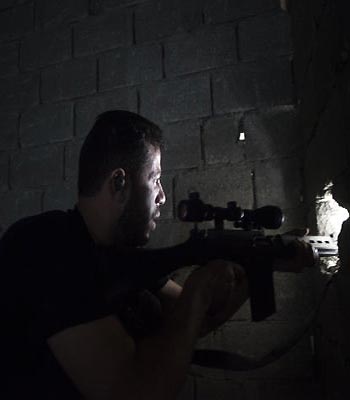
Free Syrian Army fighter scans for targets from a building in Aleppo, Syria. (AP)
NEW YORK (Reuters) – The United States and France announced increased support for opponents of Syrian President Bashar al-Assad on Friday, but there was no sign that the direct military aid the rebels want to create safe havens for civilians is on the way.
U.S. Secretary of State Hillary Clinton told a meeting of foreign ministers in New York that the United States would provide an additional $45 million in non-lethal and humanitarian aid to the Syrian opposition.
Of this, $30 million would be for humanitarian assistance and $15 million for non-lethal help, such as radios and training. The new pledges pushed total U.S. humanitarian aid for Syria to more than $130 million, and non-lethal aid to opposition groups to almost $45 million.
French Foreign Minister Laurent Fabius told the same meeting of the so-called Friends of Syria – an informal group of countries supporting Assad’s ouster – that Paris was increasing its contacts with Syria’s armed rebels.
“The process is complex but the Syrian people have been waiting for 18 months for the opposition to succeed to move forward,” Fabius said. “It is within this perspective that France has increased its contacts with representatives of the armed opposition.”
British Foreign Secretary William Hague backed an increase in practical support to Syria’s political opposition, especially to those who needed to provide services in rebel areas.
The 18-month-old uprising against Assad has descended into a civil war. More than 30,000 people have been killed, according to opposition activists, and there are fears the conflict could destabilize the wider Middle East.
But despite Friday’s announcements, foreign assistance to the Syrian rebels has fallen well short of the foreign-protected safe havens the opposition wants and offers little hope of relief to the worsening plight of civilians.
France started channeling aid to rebel-held parts of Syria in August so that these safe havens could administer themselves and help stanch a flow of refugees trying to escape deadly air strikes by Assad’s forces.
However, credible protection for “liberated” areas would require no-fly zones patrolled by foreign aircraft and there appears little chance of this happening.
Such an intervention would require a mandate from the U.N. Security Council – something resolutely opposed by veto-wielding members Russia and China.
The council’s deadlock appears unbreakable at the moment, Western diplomats say.
The deadlock led frustrated Western powers, Turkey and Gulf Arab states to establish the informal Friends of Syria group, but Western powers have said they will not supply weapons to the lightly armed Syrian rebels, who have few answers to attacks by Assad’s combat planes and helicopter gunships.
CLINTON BLAMES IRAN
Clinton blamed Iran for propping up Assad, saying Tehran would do all it could to support him. “Let’s be very frank here – the regime’s most important lifeline is Iran,” she said.
“Last week a senior Iranian official publicly acknowledged that members of the Iranian (Islamic) Revolutionary Guard Corps are operating inside Syria,” Clinton said.
“There is no longer any doubt that Tehran will do whatever it takes to protect its proxy and crony in Damascus. Iran will do everything it can to evade international sanctions.”
She was referring to international steps to force Iran to abandon its nuclear program, which the West says is aimed at producing atomic bombs. Tehran says the program is for generating electricity and other non-military purposes.
The U.N. General Assembly’s annual gathering of world leaders this week saw sharp clashes between Iran and Israel.
Israeli Prime Minister Benjamin Netanyahu suggested that Israel might take military action to prevent Iran from reaching the point where it has enough enriched uranium for a bomb. On Friday, the United Nations urged all sides to tone down “shrill war talk.”
Arab League chief Nabil Elaraby told the Friends of Syria group, which was meeting on the sidelines of General Assembly, that the situation in Syria was becoming “more explosive.”
“We need to start a transitional period,” he said. “A transitional period means a change to another regime.”
The Friends of Syria includes the United States, Britain, France, Germany, Saudi Arabia, Qatar and Turkey. Russia and China, which have vetoed three U.N. Security Council resolutions condemning Assad’s onslaught on the opposition, are not members.
Turkish Foreign Minister Ahmet Davutoglu, who attended the meeting, later told the U.N. General Assembly it was “the inability of the Security Council to act that still encourages the Syrian regime to kill ever more people.”
“The situation in Syria has evolved into a real threat to regional peace and security,” he said. “The Syrian regime deploys every instrument to turn the legitimate struggle of the Syrian people into a sectarian war, which will engulf the entire region into flames.”
Qatari Foreign Minister Hamad bin Jassim bin Jaber al-Thani told reporters he was not satisfied with the international response on Syria.
“We have to send a military force to stop the bloodshed, this is request from Qatar’s emir,” he told reporters.
German Foreign Minister Guido Westerwelle called the blockage at the Security Council “unacceptable,” and added: “It is necessary to unite the opposition.”
Qatar said it would organize a meeting soon to try to unite all strands of the Syrian opposition in an effort to create a provisional government. Earlier this week, Qatar called for Arab nations to “interfere” in Syria.
Fabius said he wanted this government to be recognized by the Friends of Syria at its next meeting in Morocco.
Moroccan Foreign Minister Saad-Eddine Al-Othmani said the meeting would probably be held on November 1, but he did not expect it to reach a plan on how to proceed.

Syrian rebel fighters take their position during fighting with government troops in the old city of Aleppo. (AFP)

Demonstrators protest against Syria’s President Bashar al-Assad after Friday prayers in Binsh. (R)
